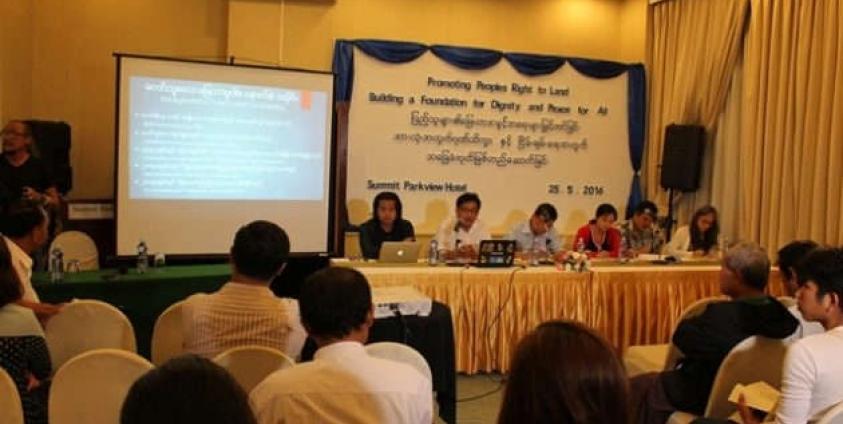Karen National Union leaders has called for respective state and regional governments to recognized land rights and policies that are already in place for decades in ethnic areas and agreed to by both ethnic communities and armed groups.
Padoh Mahn Mahn, the joint general secretary of the Karen National Union made the call to the government during the launch of the KNU’s land policies in Rangoon on May 25. Padoh Mahn Mahn said that the KNU wanted the “state governments to recognize the landownership and land rights [documents] issued by ethnic armed organizations to the people.”
Padoh Mahn Mahn said that the there needed to be more than just recognition of the agreements between ethnic communities and armed groups.
“There needs to be a mechanism in place to deal with land management and landownership disputes. The other important thing is that the ethnic nationalities customary laws regarding land ownership need to be recognized.”
The 2008 Constitution is in stark contrast to the KNU’s position, that all land effectively is the property of the State.
The KNU said that their initiative to put in place the land policy is to protect customary land rights include ownership, land tenure rights and having the community to have a say and having a fair share of the natural resources in their native lands with aims towards a sustainable development.
In the KNU’s Land Policy paper there are six chapters that cover farmland, forests, water resources, fishery and other natural resources.
Saw Alex from the Karen Environmental and Social Action Network who was a panelist at the launch of the KNU land policy pointed out that ethnic nationalities traditionally own their farmland and in their areas, there are no vacant land or fallow land.
Invest in Myanmar, a web-based business advisory guide, explains that the Vacant, Fallow and Virgin Lands Management Law that “…was passed as an amendment to The Farmland Bill, stipulates that any unused land can be claimed and utilized by willing individuals (foreign or local investors included). This means that people cannot simply purchase land and then leave it vacant; they must make the land economically productive.”
Invest Myanmar points out that “…foreign investors involved in joint ventures with Myanmar companies or with the government can apply to use land that is currently not being used. Activities that are permitted include agriculture, mining, raising livestock and other ventures.”
Sai Nyunt Lwin, General Secretary of the Shan National League for Democracy who attended the launch of the KNU’s land policies said that they are opposite to the view of the previous military government.
“In the past, there was a idea that all the farmland, forestland and water belonged to the state. Now the KNU land policy paves the way that they belong to the people. This is the right time to launch this policy as the issues are likely to be discussed as part of ongoing political dialogue.”
The launch event attended by representatives of various Karen political parties, ethnic parties, civil society organizations, land rights activists, local and international media.
According to the KNU, their land policy was first approved and launched during the 9th KNU’s Congress back in 1974. It was reviewed and updated in 2000 and approved by its Central Executive Committee in December 2015.








